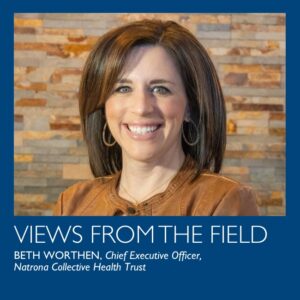Beth Worthen, Chief Executive Officer, Natrona Collective Health Trust
The Natrona Collective Health Trust (NCHT) was created in October 2020 after the sale of our community’s standalone nonprofit hospital to a regional hospital system. As Wyoming’s first health conversion foundation, NCHT uses trust-based philanthropy and systems change advocacy to advance the mental well-being of our community’s young people. During an extensive strategic planning process, we found that at both our community and state levels, there is insufficient infrastructure to address mental and behavioral health needs, which perpetuates health disparities and high incidences of childhood trauma.
Challenges with mental and behavioral health manifest themselves in profoundly harmful ways. Wyoming ranks number one in the United States for suicide deaths at double the national average rate (American Foundation for Suicide Prevention 2021). Suicide is the seventh leading cause of death in Wyoming; however, it is the second leading cause of death for ages 15-24 (Drapeau and McIntosh 2020).
Knowing that we needed to deploy a trust-based approach using the expertise of those closest to these challenges, we assembled a diverse group of youth ages 14-17 and launched a participatory grantmaking (PGM) program in the fall of 2022. The youth participating in the NCHT program ultimately chose to support organizations that assist youth in overcoming addiction and homelessness, preventing suicide, combating domestic violence, and meeting mental health needs. In May 2023, they granted nearly $240,000 of NCHT funds to these organizations for general operating support.

NCHT followed the participatory grantmaking model in first empowering the youth participants to design their purpose statements. This process resulted in the following statements that eventually became a useful guide as they made grant decisions:
- Working youth to youth, we will help ourselves by helping others.
- Our lived experiences will be our guide.
- Our diversity is our strength.
- We will change our community in positive ways.
As they designed the grant application and process, the participants decided to open an application for organizations working to improve mental and behavioral health for youth ages 0-21 and to prioritize applicants working with vulnerable populations such as homeless youth. As they worked to learn more about organizations who fit this criterion and review the applications, the participants met twice a month over the school year calendar period of nine months. They were compensated for their time and expertise each time they attended meetings.
With a full program cycle in our rear-view mirror, we’ve captured some lessons learned for our participatory grantmaking road ahead. These include:
Maintain a balance between structure and flexibility
While the tenets of trust-based philanthropy and participatory grantmaking prioritize shifting power away from the grantmaking organization, there are areas in which the organization can lean into structure to maximize the program’s effectiveness. NCHT found that program staff communicating consistently via text messages, setting up a compensation method, and creating a shared Google folder to store application ideas and due diligence updates helped youth participants build confidence in the process.
We prioritized flexibility throughout the course of the program based on input from youth participants. For example, NCHT originally planned the program to last three to five months, but the youth participants wanted to hold the program over the full course of the school year. This provided significant opportunities to cultivate meaningful connections between the participants and NCHT staff.
Broaden the definition of impact
Youth participants awarded funds to support an outdoor leadership program for children who have experienced domestic violence, expand mental health services in local high schools, provide therapy and other supports for homeless students, and bolster interventions for teens with addiction. They chose to provide the funds in the form of general operating support to make them as flexible as possible for the organizations.
As positive as these results are for our organization and community, the outcomes from the process itself were equally rewarding. The program went beyond its primary objective of granting funds to having a transformative effect on the participating youth members. We witnessed the youth experiencing profound personal growth, leadership skills development, and increased confidence. They created a strong sense of belonging as they built a cohesive and supportive group dynamic over the course of nine months—one that continues to this day.
“I really appreciate the impact that PGM has had on my life,” said Janessa Miramontes, who was an active participant in the PGM project and serves as a youth community representative on NCHT’s Program Committee. “Through my time in the NCHT program, I’ve learned about building relationships and embracing diverse points of view—I’ve also become more aware of our community’s needs and feel more empowered to take action to make a difference.”
Maximize organizational resources
While the senior program staff facilitated the PGM program, NCHT experimented with assigning a coordinating role to our office’s intern, a nontraditional student pursuing her Master of Social Work degree. We found that the PGM program was a good fit for the role of an intern, as it gave her a rewarding project to run within the internship timespan. Now that we have a better understanding of the PGM process and responsibilities, we plan to have a future intern take a lead role in the next cycle.
What’s next
With a focus on youth and mental health, NCHT is actively engaged in mitigating the impact of adverse childhood experiences (ACEs). In Wyoming, the rate of a child having an incarcerated household member is more than twice the national average (National Survey of Children’s Health 2021). NCHT is currently working to create and support programs related to post-incarceration transitions and diversion measures to reduce our community’s recidivism rate and mitigate the effects of this specific ACE. In 2024, we’ll launch a participatory grantmaking program composed of individuals recently released from incarceration to identify and fund supports that help with a successful transition into the community.
Next spring, NCHT will also connect with the youth participants from its first PGM cycle to invite them to be a part of the next reporting and evaluation process.
References
American Foundation for Suicide Prevention. Suicide Statistics. New York, NY: September 2021.
Child and Adolescent Health Measurement Initiative. 2020-2021 National Survey of Children’s Health (NSCH) data query. Data Resource Center for Child and Adolescent Health supported by the U.S. Department of Health and Human Services, Health Resources and Services Administration (HRSA), Maternal and Child Health Bureau (MCHB). Retrieved August 25, 2023, from childhealthdata.org.
Drapeau, C. W., and J. L. McIntosh. American Association of Suicidology. Suicide: 2019 Official Final Data. Washington, DC: December 23, 2020.

